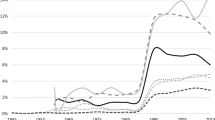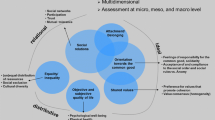Abstract
I defend an old argument against co-location—the view that human animals are distinct from, but co-located with human persons. The argument is drawn from St. Thomas Aquinas. In order to respond to the argument, co-locationists have to endorse at least one of a trio of claims, none of which is obviously correct. Further, two of the options do not seem to be the sort of positions that should be flowing out of the acceptance of a general metaphysical position. I conclude that co-locationism is more costly than generally thought.
Similar content being viewed by others
Notes
Of course, St. Thomas didn’t design the argument for use against co-locationists. But that’s not especially important. Let me also note for the historically sensitive that I am rather violently distorting St. Thomas’s notions of “sense” and “understand.” What I mean by “sense” is, more or less, what he meant by “understand.” And to “understand,” as I use the term, is to have, a priori knowledge or rational insight, or to grasp a complicated structural relationship. (For this latter sense, see Linda Zagzebski, “Recovering Understanding,” in Knowledge, Truth, and Duty, Matthias Steup, ed. [Oxford: Oxford University Press, 2001], 235–251.) Lastly, and most importantly for my purposes here, I shall take what Lynne Rudder Baker calls first-personal intentional states as instances of understanding.
I borrow this formulation of Aquinas’s argument, with slight modification, from Patrick Lee, “Human Beings are Animals,” International Philosophical Quarterly 37 (1997), 291–303. The textual basis for the premises is Summa Theologiae I, 75, 3&4, and I, 76, 1.
Cf. Hud Hudson’s discussion of “Thinker” and “Feeler” in A Materialist Metaphysics of the Human Person, (Ithaca, NY: Cornell University Press, 2001), 114ff. Hudson would reject premise 2, but this rejection would flow from his acceptance of temporal parts, which Baker and other co-locationists reject.
Cf. Lynne Rudder Baker, Persons and Bodies (Cambridge: Cambridge University Press, 2000), 104. As far as I know, Baker is not aware of this argument. When I speak of her “denying” or “granting” its premises, I mean that she has explicitly rejected or accepted propositions equivalent to the premises in this argument.
Baker, 46 ff.
The * makes explicit that the first person pronoun that precedes it is indicative of a first-personal intentional state. Note that the “I” in “I wonder” does not have a *. That’s because not every first person pronoun indicates a first-personal intentional state.
Of course, all animals are, on Baker’s view, non-personal, although some do constitute persons. By “non-personal animal,” I mean animals that do not—still on Baker’s view—constitute persons.
Ibid., 67.
Ibid., 104.
The details of how this all works are, no doubt, open to serious philosophical dispute. Nevertheless, I take it as a non-negotiable phenomenological fact that I do indeed see doves as doves.
St. Thomas himself distinguished between the vis aestimativa (in animals) and the vis cogitativa (in human beings). These powers are analogous, but different in kind. On this distinction, see Summa Contra Gentiles, II, 60.
Indeed, there are hints in her work that she might be willing to say this. She says, for example, that a dog, if it had language, could express the thought “I see food.” (Baker, 61.) She notes that this is “intended to be neutral with respect to what ‘representations’ (if any) [are] ‘tokened’ in the dog’s brain.” She also speaks of dogs using language on p. 67. These locutions, surely, are simply heuristic devices, and shouldn’t be taken too seriously. But I do think they indicate that Baker may be willing to attribute conceptual ability to animals. See also n. 11 on p. 64, which indicates that Baker is wary of, but not adamantly opposed to, attributing conceptualization to non-human animals.
Ibid., 64. See also the passage from p. 67, cited above (n. 12).
Cf. Ibid., 92 n. 1 for her discussion of infants and first-personal intentional states, and 62-63 for her discussion of chimps.
Indeed, Jonathan Lowe doesn’t need to be coaxed to deny premise 1. He thinks animals have “souls” (by which term he does not mean to imply any immateriality) and it is these souls—not their affiliated animals—that (both) sense and understand. (Cf. E.J. Lowe, Subjects of Experience [Cambridge: Cambridge University Press, 1996], 49n.)
This definition comes from: http://www.messiah.edu/org/acclamation/BALLET/Terminol.htm.
Author information
Authors and Affiliations
Corresponding author
About this article
Cite this article
Toner, P. An Old Argument Against Co-location. Int Ontology Metaphysics 8, 45–51 (2007). https://doi.org/10.1007/s12133-007-0004-9
Published:
Issue Date:
DOI: https://doi.org/10.1007/s12133-007-0004-9




